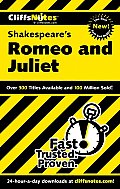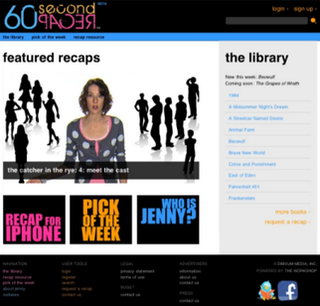
Stephen Jay Greenblatt is an American Shakespearean, literary historian, and author. He has served as the John Cogan University Professor of the Humanities at Harvard University since 2000. Greenblatt is the general editor of The Norton Shakespeare (2015) and the general editor and a contributor to The Norton Anthology of English Literature.

CliffsNotes are a series of student study guides. The guides present and create literary and other works in pamphlet form or online. Detractors of the study guides claim they let students bypass reading the assigned literature. The company claims to promote the reading of the original work and does not view the study guides as a substitute for that reading.
Originality is the aspect of created or invented works that distinguish them from reproductions, clones, forgeries, or substantially derivative works. The modern idea of originality is according to some scholars tied to Romanticism, by a notion that is often called romantic originality. The validity of "originality" as an operational concept has been questioned. For example, there is no clear boundary between "derivative" and "inspired by" or "in the tradition of."
Academic dishonesty, academic misconduct,academic fraud and academic integrity are related concepts that refer to various actions on the part of students that go against the expected norms of a school, university or other learning institution. Definitions of academic misconduct are usually outlined in institutional policies. Therefore, academic dishonesty consists of many different categories of behaviour, as opposed to being a singular concept.

Study guides can be broad based to facilitate learning in a number of areas, or be resources that foster comprehension of literature, research topics, history, and other subjects.

"To a Skylark" is a poem completed by Percy Bysshe Shelley in late June 1820 and published accompanying his lyrical drama Prometheus Unbound by Charles and James Ollier in London.
OkCupid is a U.S.-based, internationally operating online dating, friendship, and formerly also a social networking website and application. It features multiple-choice questions to match members. Registration is free. OKCupid is owned by Match Group, which also owns Tinder, Hinge, Plenty of Fish, and many other popular dating apps and sites.
Turnitin is an Internet-based plagiarism detection service run by the American company Turnitin, LLC, a subsidiary of Advance Publications.
Bartleby.com is an American electronic text archive, headquartered in Los Angeles (USA) and named for Herman Melville's story "Bartleby, the Scrivener". It is a commercial website operated by Barnes & Noble, though its repository of texts can still be accessed. The repository has four main categories: reference, verse, fiction, and nonfiction.
Barnes & Noble Education is one of the largest operators of college bookstores in the United States. As of the end of 2020, Barnes & Noble Education operated 760 campus bookstores and school-branded e-commerce sites through its Barnes & Noble College Booksellers division. The company is headquartered in Basking Ridge, New Jersey.
Flocabulary is a Brooklyn-based company that creates educational hip hop songs, videos and additional materials for students in grades K-12. Founded in 2004 by Blake Harrison and Alex Rappaport, the company takes a nontraditional approach to teaching vocabulary, United States history, math, science and other subjects by integrating content into recorded raps. Flocabulary's website features videos, lesson plans, activities and assessment or with songs. The company's name is a portmanteau of "flow" and "vocabulary".
File sharing is the practice of distributing or providing access to digital media, such as computer programs, multimedia, documents or electronic books. Common methods of storage, transmission and dispersion include removable media, centralized servers on computer networks, Internet-based hyperlinked documents, and the use of distributed peer-to-peer networking.

Plagiarism is the fraudulent representation of another person's language, thoughts, ideas, or expressions as one's own original work. Although precise definitions vary, depending on the institution, such representations are generally considered to violate academic integrity and journalistic ethics as well as social norms of learning, teaching, research, fairness, respect, and responsibility in many cultures. It is subject to sanctions such as penalties, suspension, expulsion from school or work, substantial fines, and even imprisonment.
Course Hero is an American education technology website company based in Redwood City, California which operates an online "pay to use" learning platform for students to access course-specific study resources. Subscription is required for students to use the platform.

60second Recap is an educational video project launched in September 2009 to provide 60-second video summaries and analysis of classic literature. The site provides one-minute video commentaries on plot, themes, characters, symbols, motifs, and other aspects of books commonly studied in secondary schools in North America.

The Barnes & Noble Nook is a brand of e-readers developed by American book retailer Barnes & Noble, based on the Android platform. The original device was announced in the U.S. in October 2009, and was released the next month. The original Nook had a six-inch E-paper display and a separate, smaller color touchscreen that serves as the primary input device and was capable of Wi-Fi and AT&T 3G wireless connectivity. The original Nook was followed in November 2010 by a color LCD device called the Nook Color, in June 2011 by the Nook Simple Touch, and in November 2011 and February 2012 by the Nook Tablet. On April 30, 2012, Barnes & Noble entered into a partnership with Microsoft that spun off the Nook and college businesses into a subsidiary. On August 28, 2012, Barnes and Noble announced partnerships with retailers in the UK, which began offering the Nook digital products in October 2012. In December 2014, B&N purchased Microsoft's Nook shares, ending the partnership.
Sylvan Saul Barnet was an American literary critic and Shakespearean scholar. He was a Fletcher Professor of English Emeritus at Tufts University and the general editor of the Signet Classics Shakespeare.
David D. Kirkpatrick is an American, London-based international correspondent for The New York Times. From 2011 through 2015, he served as its Cairo bureau chief and a Middle East correspondent. He has received three Pulitzer Prizes as part of various teams at The New York Times.
Shmoop University Inc. is a for-profit online educational technology company that specializes in test preparation materials, mental health tools, and learning content for K-12 schools. Shmoop offers free study guides aimed at teens on a range of subjects, including literature, biology, poetry, U.S. History, civics, financial literacy, and music. The content is notable for combining rigorous academic study with a frank voice, irreverent sense of humor, and approachable style that is free of pretense.






